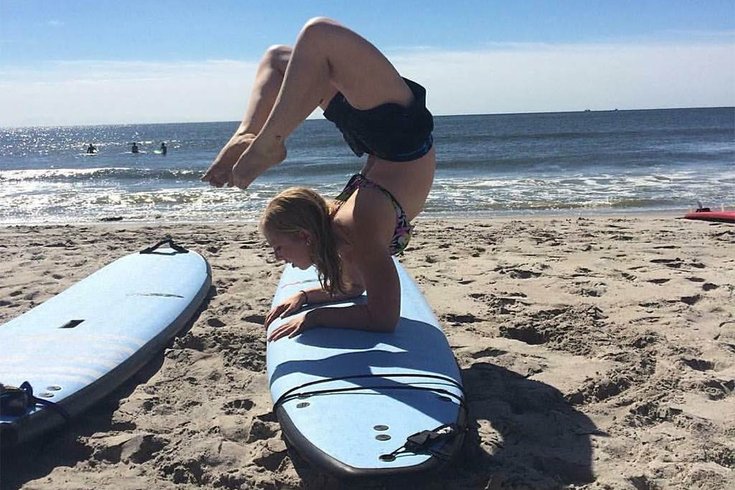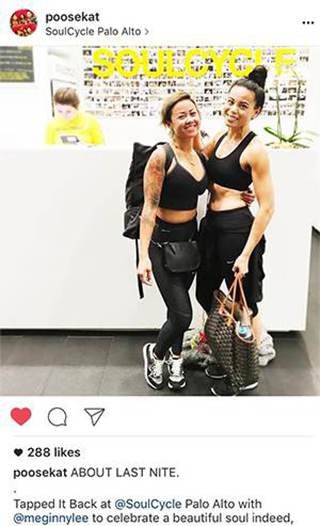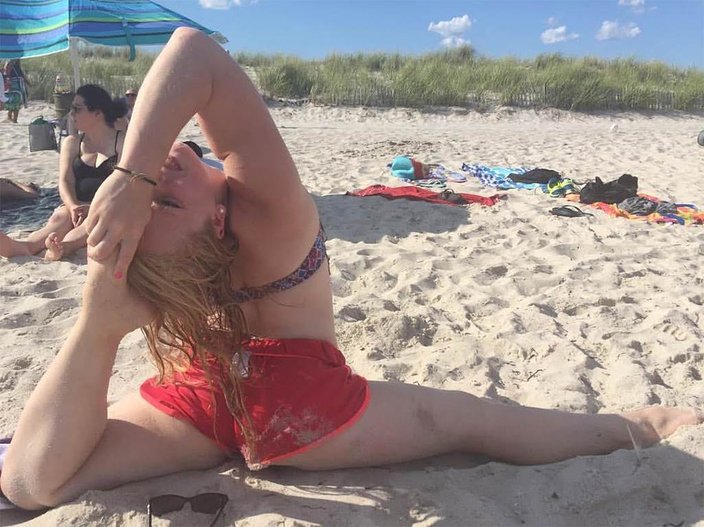
November 30, 2016
 Hannah Kerin/via Instagram
Hannah Kerin/via Instagram
Hannah Kerin, a 24-year-old yoga teacher, says the move toward body diversity acceptance helped her recover from eating disorders. "As a recovered anorexic," she says, "I believe self-love and acceptance is crucial to being able to enjoy all of the amazing things our bodies can do.”
Days after Thanksgiving, panic over holiday weight gain sets in. Most people dread putting on 5-7 pounds from November through the New Year. Even though that figure is somewhat inflated (the average adult gains just one measly pound), the holiday season pressures men and especially women to scrutinize their appearance.
It’s a terrible time of year to cultivate a positive body image, particularly at the gym.
Thankfully, last week, a body positivity group called Movemeant Foundation launched a compelling social media campaign that champions strong, fit women, whether they have six-pack abs, loose skin, abdominal fat, or a smattering of stretch marks. A video titled “Own Your #BellyJelly” offers a new approach to how we view fitness.
Featuring women whose bodies jiggle and shake while they pump heavy weights and sprint into high gear, “Own Your #BellyJelly” doesn’t just empower women to bare their so-called imperfections; it highlights each body type for its unique beauty and capability.
It’s a stark contrast to the advertising I grew up with, such as this 1999 television advertisement for Bally Total Fitness. Curiously devoid of men, it features taut, toned young women spinning and kickboxing instead. While it might have seemed progressive then, to see women punch and kick and sweat, the commercial embodies the old cliché: that fitness is leanness, sexiness and youth. That strength is smooth skin.
This is the message that warped my generation’s brains and bodies. It strained our relationships. It left us distorted, physically and emotionally.
Now, women around the world are embracing the #BellyJelly campaign and triumphantly posting their own bare, imperfect midriffs to social media.
Hannah Kerin, a 24-year-old yoga teacher and amateur aerialist from Plainview, New York, says the cultural movement toward body diversity acceptance is what helped her recover from a battle with eating disorders.
"Mostly, I get praise from other women, who are in awe of me being a mother and comfortable in my skin.” – Katherine Naugle, fitness instructor and mother
“While I was growing up, gym advertisements were mainly comprised of the ‘perfect body.’ The women were emaciated and the men were abnormally ripped,” she said.
A dancer, who endured ridicule for her body growing up, Kerin said she was left emotionally scarred and scared to wear revealing clothing to work out. Now, she wears a sports bra to spin class, because it’s more comfortable to sweat without being trapped beneath a sopping t-shirt. She’s even taken to celebrating her body and its incredible flexibility on her Instagram.
“I hope the #BellyJelly campaign helps people of all shapes and sizes feel confident and empowered to spread their beauty through movement. As a recovered anorexic, I believe self-love and acceptance is crucial to being able to enjoy all of the amazing things our bodies can do.”
Hannah Kerin, an amateur aerialist, stretches on the beach.
Katherine Naugle, a 36-year-old mother and fitness instructor from San Francisco, says she only came to accept her bare midriff because of body positivity movements like the #BellyJelly campaign.
“I was always uncomfortable in a sports bra. I didn't wear a bikini until my early 20s. When I came across Movemeant Foundation last year, I began to fully embrace being comfortable working out in a sports bra,” she said.
“I didn't wear a bikini until my early 20s,” says Katherine Naugle, right. “When I came across Movemeant Foundation last year, I began to fully embrace being comfortable working out in a sports bra.”
“Shirts get in the way during a lot of workouts! They get sweaty and loose fabric can cling. In yoga, it’s distracting to have a shirt flop around my neck when I’m in downward dog.”
Naugle says the reactions she’s received, especially from other fitness-oriented mothers, have been mostly positive.
“It’s still somewhat not culturally accepted by my Chinese family to show my belly. My parents are still prone to tell me to cover up, for modesty. Mostly, I get praise from other women, who are in awe of me being a mother and comfortable in my skin.”
Despite any criticism, Naugle has joined the #BellyJelly movement on social media, regularly posting post-workout photos on her Instagram account. She hopes to inspire other women to embrace their bodies and work out in whatever clothing feels most comfortable, despite what others might think. Naugle believes we’re our own worst critics, anyway.
“I think it’s the media that assumes people are repulsed by imperfect bodies. But we’re all imperfect. I believe more positive representations of imperfect bodies will become more mainstream as people speak up on social media. Brands will see the benefit in acknowledging this reality and eventually incorporate all kinds of bodies in their advertising.”
If Naugle is right, today’s generation of young women might take the “Own Your #BellyJelly” video campaign for granted. I hope they do. I hope the sight of women with stretch marks, and loose skin, and cellulite working out in whatever clothes they choose becomes so normalized that it no longer creates a scene. It’s not young, thin women’s exclusive right to work out with an exposed midriff. It never has been.
It never will be.
 Hannah Kerin/via Instagram
Hannah Kerin/via Instagram